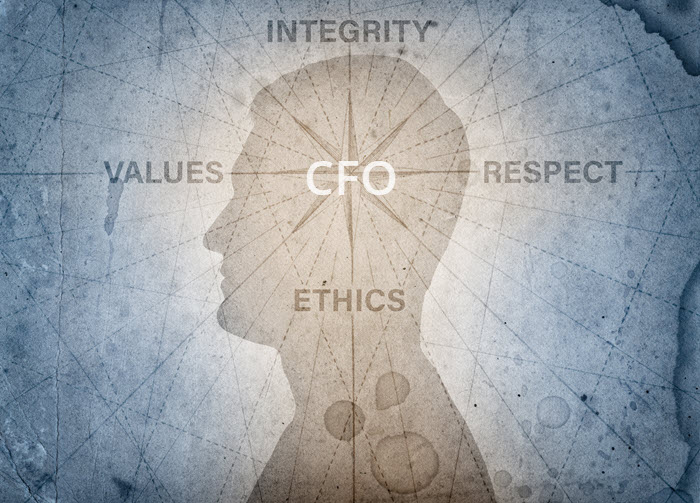
Whenever I read about a company embroiled in accusations of fraud, my first thought is, "Where was the CFO?" As I've written, risk mitigation is a critical element of the CFOs' responsibilities. What could be riskier than being an officer of a company engaged in fraudulent activities?
Much is written about embezzlement or malfeasance, generally carried out by a single individual with access and need. While these cases can run into significant amounts of money, they are nothing compared to systemic fraud that the entire executive team of a corporation may carry out.
Corporate fraud can take on many forms, from hiding product risks from consumers to Ponzi schemes. There are two constants in nearly all cases of systemic corporate fraud:
1) Collusion, generally among two or more senior executives. In many cases, the CFO was aware, if not directly involved, in the fraudulent activity; and
2) Financial Statement misrepresentation, in which the CFO is almost certainly involved.
Why would a CFO risk their job, home, life savings, personal and professional reputation to stand idly by, or worse, participate in corporate fraud?
The trial of several executives of Aequitas Capital Management has been big news of late in Portland. In the articles I've read and people I know who worked there over the years, a theme became clear: CEO Robert Jesenik was a charismatic leader with a "Louis XIV management style." He was able to inspire and excite his leadership team while knowingly deceiving investors.
Ex-CFO Olaf Janke resigned because he "didn't feel respected and couldn't get the company to cut expenses or stop its cash madness." He has since pleaded guilty to conspiracy to commit mail and wire fraud and conspiracy to commit money laundering and has now testified against his former boss. His testimony clearly shows that he knew what was going on at Aequitas but didn't sound the alarm bells.
Not all CFOs would allow this behavior to be perpetrated in their organization. I would argue that CFOs are typically risk-averse, high-integrity, and ethical, and most would not be willing to stand by and watch fraud occur within their organizations. I would wager that without high-integrity CFOs, much more fraud would occur in businesses.
There are numerous examples of CFOs behaving ethically, despite the repercussions experienced by their companies. One high-profile example involved Intel's former CFO, Andy Bryant, who discovered a significant accounting error that would have resulted in the company overstating its earnings. While there was no indication of malintent, a significant accounting error can negatively impact a company's credibility with the investment community and, therefore, its stock price. Rather than ignore or hide the error, Bryant ethically reported it to the CEO and Board of Directors, potentially preventing a scandal.
It takes 20 years to build a reputation and five minutes to ruin it. If you think about that, you'll do things differently.”
- Warren Buffett -
There are many ways a CFO may actively encourage strong ethics and prevent fraud in their organizations, including:
-
 Holding oneself to the highest standard of personal integrity. A CFO I worked with earlier in my career modeled this behavior perfectly. She would never stand down in the face of a challenge to what she knew to be the proper course of action. Undoubtedly, she would have accepted being fired far sooner than she would have accepted inappropriate ethics in the company. She set the example for the rest of the organization, in both her finance team and the rest of the organization's leadership team.
Holding oneself to the highest standard of personal integrity. A CFO I worked with earlier in my career modeled this behavior perfectly. She would never stand down in the face of a challenge to what she knew to be the proper course of action. Undoubtedly, she would have accepted being fired far sooner than she would have accepted inappropriate ethics in the company. She set the example for the rest of the organization, in both her finance team and the rest of the organization's leadership team. - Establishing a code of ethics outlines the expectations of all employees and provides the means for safe, confidential reporting of unethical behavior by whistleblowers.
- Ensuring accurate financial statements. Systemic fraud doesn't occur undetected unless the financial statements are misrepresented. The CFO must ensure an appropriate control environment and that financial statements are prepared following generally accepted accounting standards.
While ethics in business should be everyone's responsibility, the CFO is in a unique position to influence outcomes and, therefore, must hold him or herself to the highest standard of integrity.
About the Author
 Jeff Dunn is a Partner with CFO Selections, serving as the Practice Manager for the Oregon & Southwest Washington region. Jeff has led the practice since establishing it in 2013. During that time, he has also served as an outsourced CFO to clients in the emerging tech space, manufacturing, distribution, digital media, and marketing industries.
Jeff Dunn is a Partner with CFO Selections, serving as the Practice Manager for the Oregon & Southwest Washington region. Jeff has led the practice since establishing it in 2013. During that time, he has also served as an outsourced CFO to clients in the emerging tech space, manufacturing, distribution, digital media, and marketing industries.
Prior to joining CFO Selections, Jeff was the CFO of Getty Images, a global digital media company. During his tenure there he participated in numerous acquisitions, including taking Getty private in a PE-backed transaction. Prior to joining Getty, Jeff was the VP of Finance for an e-commerce start-up, and in the Corporate Controller group at Tektronix. He began his career in Audit and Assurance at Deloitte.
As he leads the Oregon & SW Washington Practice, Jeff's extensive experience in business leadership, strategy, and finance has enabled him to quickly understand and assess each client's unique needs and develop strategies for the CFO Selections team to add value to each engagement.
Outside of CFO Selections, Jeff can be found in the mountains on a bike, on foot, or on skis. An accomplished mountain bike racer, Jeff volunteers his time and talent as Treasurer for a nonprofit trail advocacy group and leads beginner skills.





